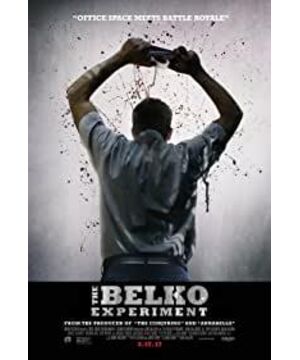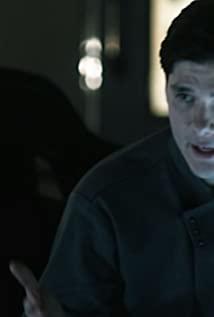The first question: At the very beginning, there were three security guards (the third security guard appeared to block the local staff at around 2:30) checking the vehicle and taking the dog along. My question is "what to check". If only local employees are excluded, there is no need to check the bottom of the car and the trunk at all. If it is to check the weapons, it does not seem to be very strict. After all, there is no inspection in the car. Second question: The old hangar console appeared around 5:00, with three people and about twenty monitoring screens in it. My question is "how can this monitor a building with nearly ten floors", from the back story, we can know the density of cameras, there are three in one bathroom, how does the old hangar console track eight people through this area? Ten people? Especially at the beginning of the murder count in the middle plot, how to accurately monitor the murder count of each person? To be honest, when I saw this place, I was thinking of a surveillance team with a large number of people behind it, or a camera data AI system that can automatically determine the number of homicides in chaos, especially in the absence of lights. Of course, if the monitoring party does not care about too specific data, it is another matter. The third question: At 20:00, a girl who was haggard died (the first one), and when the yellow hair next to him was still pretending, the girl started to have a headache reaction, and then died with a headshot in about three seconds. . My question is "why does it explode without any delay when the protagonist fights back against the console at the end?" Is it because the distance is close and there is no delay? If this is the case, then the delay time on the roof and the first floor will be different? The fourth question (not really a problem, but a rant to the director): The death arrangement of the maintenance worker is a bit deliberate, the young maintenance worker seems to have some mental problems, and he can accidentally kill people with a little stimulation from the outside world, and he has a strong tendency to violence , but I didn't lay the groundwork for this before, and it always felt a bit awkward. My slot is "why must the maintenance worker die first", imagine if the maintenance worker does not die, what effect will it have on the stability of the experiment? Personally, I think the director arranged for the maintenance worker to die in order to eliminate the audience's expectations for the maintenance worker, so as to focus on the real killing experiment. The fifth is not a problem, but a slot (I want to complain about this!): At 34: Around 00, after the headshot test, Barry (that is, the leader) actually started planning to kill 30 people, and he told others frankly (brother, if I had such a plan, I would go to forcibly demolish the arsenal) , you said indifferently that you want to kill 30 people, everyone is afraid), especially there is a sentence at the back, sit down and have a good talk, talk about Nima Hey, who will die first among the 30 people? We will live well for you? The sixth is not a problem, but a bright spot (haha, I feel like I’ve already digressed): At around 62:00, when the heroine was about to kill the hero’s former friend with a knife, it happened to be the countdown of the first mission, as long as you kill He can live 30 more people, but the heroine is merciful. In the previous foreshadowing, the heroine is very aware of the truth of human nature and selfishness, and she has told the hero several times, but unexpectedly, she is selfless in the end. One time, it resulted in the death of 31 random people. This random death is likely to include the heroine herself, the hero, etc., which is tantamount to suicide. Of course, it doesn't matter if you read the script like the heroine. (Anyway, the old lady won't die, and the old lady's male ticket won't die either. Get the hell out of there), I gave several scenes at the end of the countdown. I even thought it would be great if someone commits suicide. Too bad no >_< ! The reason why I think it is a bright spot is because the reversal in the middle makes me think that there are at least three possibilities. One is that the heroine kills, but time has passed; the other is that the heroine does not kill; the third is that someone commits suicide. Question: In the last mission, Barry has a kill count of eleven, which is already the highest. The second kill count is seven, and the others are all one. That is to say, he has an absolute advantage at the beginning. The primary goal must be Kill the second place first, then kill two more people to hide and wait for the victory, then let's see the next evolution, Barry kills the sexy girl first, the kill count is twelve, the second place kills five (Fuck, this brother is so fierce, although it was said that he was killed by the heroine in the end, but Barry didn't know), the murder count was twelve, and the personnel director killed the deputy (the one who was squeezed to death by the elevator should be considered an accidental death). My question is: "In the final confrontation with the male protagonist, Barry saw the corpse of the second (yes, I don't remember the second's name), why are you chasing?", please, who killed this time There are a lot of people like you, and you’re going to chase the male lead for shit. Find a comfortable place to sit down and open a bottle of red wine to celebrate a little. You’re a CT. It’s OK to wait for the time to end. Of course, the director definitely won’t do it. Yes, you have to face off against each other, but Barry, who was born in the special forces, was lying on the ground by the male lead. Orz, director, your script is so annoying, you can't let Barry hide, and then the male lead doesn't want to go crazy to find Barry? It doesn't feel so weird, but you are the director and you have the final say. Eighth question: When the last two security guards escorted the male protagonist, why did they just walk in like this? There are pistols in the building. If the male protagonist has a gun at this distance, at least change them one by one, and your purpose is not to let the male protagonist die, right? But to interview him? Are there any restrictions? In the end, the male protagonist killed five people in the warehouse, three monitors, and two security guards. Remember the three security guards I wrote in the first question? That is to say, there is at least one security guard in the dark, and the male protagonist threw the gun as soon as he walked out the door. From a routine point of view, after more than a year of bomb preparations, a full set of defensive buildings, and completely isolated signals, why did such an unprofessional interview appear in the end? , at least change it one by one, and your purpose is not to let the male lead die, right? But to interview him? Are there any restrictions? In the end, the male protagonist killed five people in the warehouse, three monitors, and two security guards. Remember the three security guards I wrote in the first question? That is to say, there is at least one security guard in the dark, and the male protagonist threw the gun as soon as he walked out the door. From a routine point of view, after more than a year of bomb preparations, a full set of defensive buildings, and completely isolated signals, why did such an unprofessional interview appear in the end? , at least change it one by one, and your purpose is not to let the male lead die, right? But to interview him? Are there any restrictions? In the end, the male protagonist killed five people in the warehouse, three monitors, and two security guards. Remember the three security guards I wrote in the first question? That is to say, there is at least one security guard in the dark, and the male protagonist threw the gun as soon as he walked out the door. From a routine point of view, after more than a year of bomb preparations, a full set of defensive buildings, and completely isolated signals, why did such an unprofessional interview appear in the end?
View more about The Belko Experiment reviews











